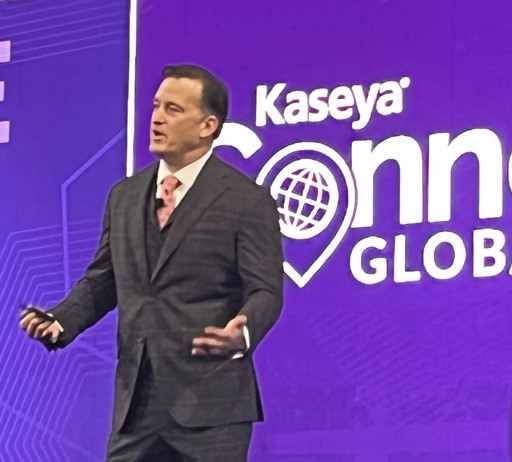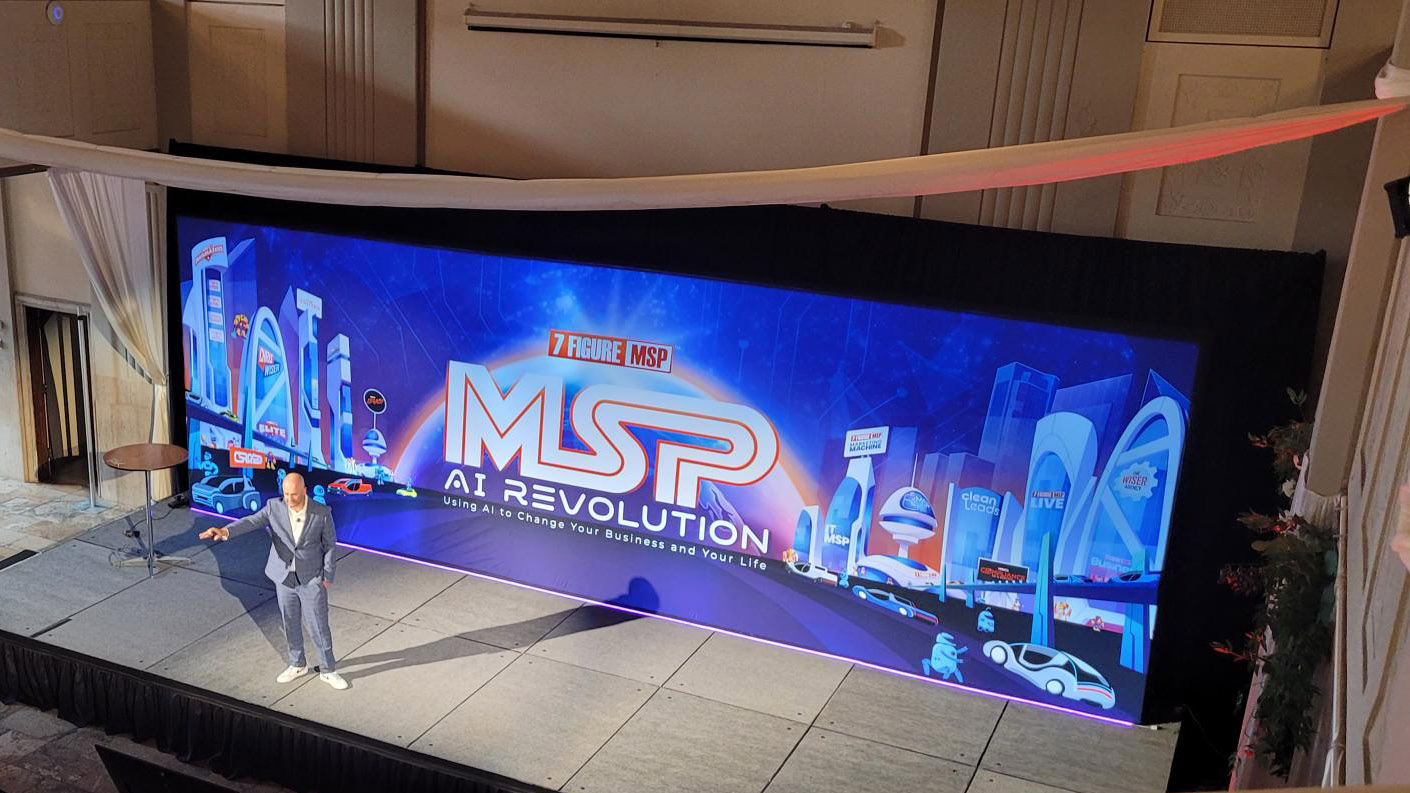Kaseya has unveiled a cyberinsurance program offering discounted coverage with almost no application hassle and a certification program aimed at producing a fresh supply of certified Kaseya technicians.
The managed services software leader announced both initiatives, plus an ambitious though less defined branding campaign spearheaded by its recent $117 million purchase of naming rights for the former FTX Arena in Miami, at its 2023 Kaseya Connect Global event today in Las Vegas.
The new cyberinsurance offering, called the Kaseya Cyber Insurance Fast Track Program, targets a familiar headache for channel pros and their clients.
“We’ve known it was a challenge because we have a lot of outreach programs to our customers,” said Kaseya CEO Fred Voccola today in a conversation with ChannelPro. “You hear a lot of the same things. Cyber insurance is a big problem.”
It’s also notoriously expensive, he noted during a keynote presentation this morning, adding that industry forecasters expect prices to double and possibly triple by 2025.
The new Fast Track Program allows users of Kaseya’s entire security stack—specifically the RocketCyber managed SOC service, Datto’s EDR solution, the Graphus email security system, the BullPhish security training platform, and ID Agent’s dark web monitoring solution—to receive $1.5 million of coverage for themselves and their clients through one of several insurers at approximately 30% below current market rates.
“If you’re an MSP and you already have insurance, it’s top off coverage,” Voccola said during a keynote presentation this morning, noting that you can replace your current policy with the new one as well if you wish.
Significantly, the program all but eliminates the lengthy questionnaires MSPs and their customers must normally complete to get coverage. In a few minutes, according to Voccola, partners who use all five specified solutions can apply for a policy via a simple form on the KaseyaOne portal.
“KaseyaOne auto-populates it because there’s only five questions,” he says. “We made this thing super easy.”
Helping clients get coverage is equally simple, Voccola continues. “As long as the MSP is using the Kaseya stack, every single one of their customers qualifies to buy that insurance at that same discounted rate,” he says, using the same five-question application form.
Building the Fast Track program was a lengthy, costly undertaking, Voccola adds. “It’s been three years in the works. We’ve invested millions if not tens of millions trying to solve that problem.”
The other new venture introduced today, called the Kaseya Remote IT and Security Management (RITSM) Certification Program, is a 40-hour training course aimed at helping current-day technicians validate their knowledge of the Kaseya platform while also preparing newcomers to IT for future roles in remote management and cybersecurity.
The new initiative, which builds on a similar initiative Kaseya launched a year ago in collaboration with Florida International University, arrives at a time when low tech unemployment rates continue to make recruiting and retaining skilled technicians a challenge for MSPs. Kaseya expects the program to have awarded 5,000 certifications by the end of this year and to have minted 1 million certified professionals by the end of 2027.
“The labor talent that this room has been looking for to assist in the scaling of your businesses, [who] already have predefined knowledge of the technology that you are using in the way you want them to use it at the rates you want to pay, will be in place,” Voccola said this morning.
Members of Kaseya’s partner program can view and contact graduates of the program, which has over 500 participants currently, via a new RITSM module on the KaseyaOne portal.
In a further announcement that shed light on Kaseya’s recent and controversial decision to buy naming rights to the Miami arena now known as the Kaseya Center, Voccola discussed plans to help Kaseya and its partners win more business by turning “Powered by Kaseya” into words broadly recognized and respected among buyers of managed services.
“We want to build brand awareness to small to midsize businesses, decision makers in those businesses, of the name Kaseya, and we want it associated with the most secure IT and security infrastructure on the planet,” says Voccola, likening the evolving initiative to Intel’s legendary “Intel Inside” branding campaign, which helped turn a company only hardware makers and their partners had heard of into a household name.
“Just like Intel helped the PC manufacturers sell more PCs because Intel was inside of it, we’re going to do the exact same thing with MSPs,” Voccola says.
At present, the Kaseya Center is the only tangible expression of that effort, but Voccola, without providing specifics, says more measures are coming. “There’ll be 10,000 more events and activities that just reinforce that brand over the coming months and years,” he says.
None will be as big as the stadium deal, he adds. None is likely to have a bigger impact either, according to Kaseya CMO Mike Sanders, who first proposed pursuing naming rights to the arena last November within hours of hearing news accounts suggesting that crypto exchange FTX was headed for imminent bankruptcy.
“There’s no arena in the U.S. in a major sport that doesn’t get a tremendous amount of exposure all the way around the country,” he says, adding that Kaseya has already updated its website to capitalize on that exposure.
“It changed dramatically on the day that we announced the Kaseya Center to be more about Kaseya’s entire ecosystem,” Sanders explains. “We really tried to drive it down to a message that somebody who wasn’t in IT could consume and could learn, and we’ve seen a tremendous amount of traffic as you would imagine.”
Kaseya also announced the acquisition of pen testing automation vendor Vonahi Security and sales presentation automation vendor audIT at the Connect Global conference today.














